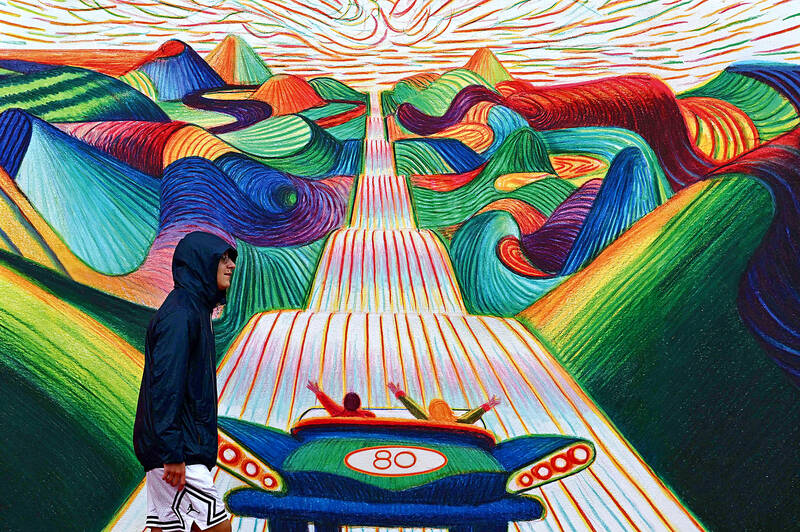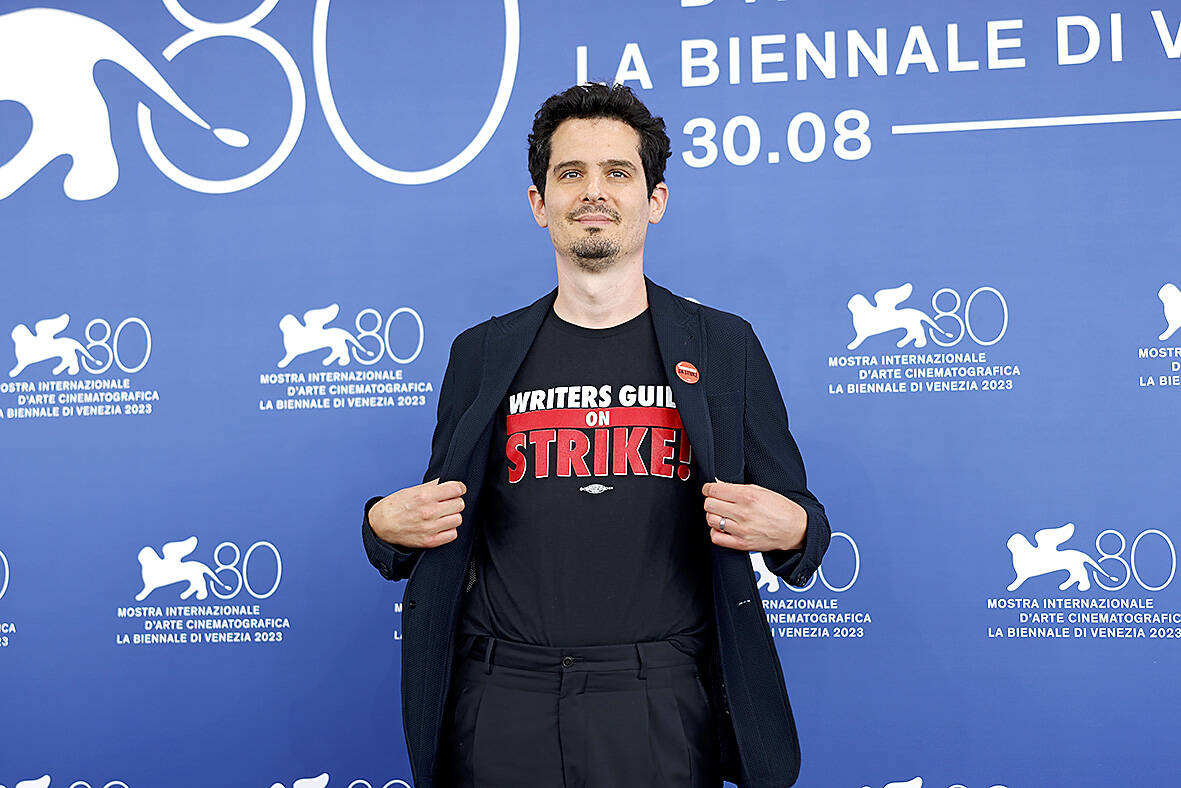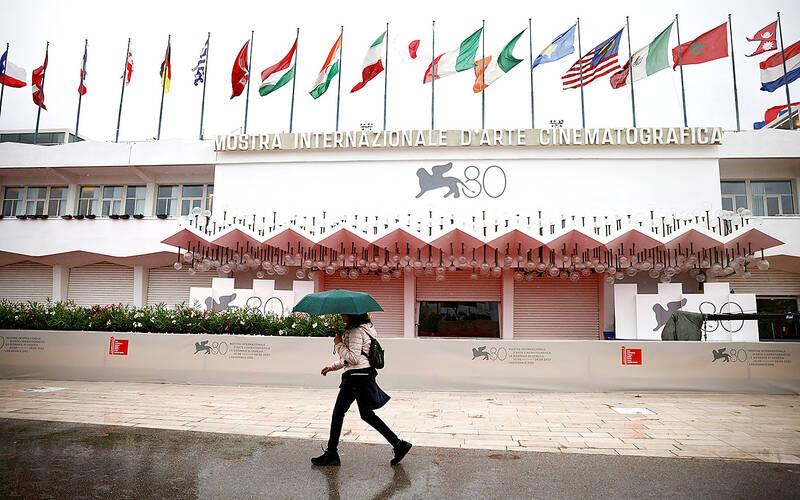Historic Hollywood strikes have robbed the Venice Film Festival of some of its usual glitz as it launched its 80th edition Wednesday, but a raft of big-name — and controversial — directors are keeping the film world buzzing.
The world’s longest-running film festival was due to start with Challengers, a tennis romance with one of the biggest stars of her generation, Zendaya.
But it was replaced at the last minute by an Italian war drama, Comandante, due to the ongoing strikes by Hollywood actors and writers — primarily over pay and the threat of AI — that has barred them from publicity work.

Photo: AFP
The rest of the line-up was largely unaffected: the festival will see Emma Stone as a Frankenstein-like creature in Poor Things and Bradley Cooper as legendary conductor and composer Leonard Bernstein in Maestro, among several Oscar contenders.
But the strikes mean those stars will not be lighting up the red carpet.
Adam Driver has been given an exemption to show up for Ferrari because the biopic by Michael Mann (Heat) was made outside the studio system.

Photo: AP
Jessica Chastain is also expected for the premiere of Memory at the end of the festival, according to Variety. It is her first outing since her Oscar-winning turn in The Eyes of Tammy Faye.
‘APOCAPLYPTIC IDEAS’
All are competing for the top prize Golden Lion, to be awarded on Sept. 9 by a jury led by Damien Chazelle, director of La La Land.

Photo: Reuters
He said he understood the anxiety around AI — which many fear could lead to computer-generated actors and scripts replacing humans — but said some of the fears may be overblown.
“People have some apocalyptic ideas about it,” said Chazelle a few hours before the festival opening. “I agree it’s a major technological change like the Internet or radio, and it will overturn a lot of things, but the art will survive.”
Other attention-grabbing entries include Sofia Coppola’s Priscilla, about Elvis Presley’s wife, and The Killer by David Fincher, who returns to the Lido two decades after Fight Club was famously booed at the festival only to become a cult hit later.
‘ABSOLUTELY INCOMPREHENSIBLE’
But with less star gossip, a lot of attention risks being absorbed by the inclusion of Woody Allen with Coup de Chance (his 50th film and first in French) and Roman Polanski with The Palace, both in the out-of-competition section.
Allen, 87, was investigated for an alleged assault on his adopted daughter in the 1990s. Though cleared by police, he has been effectively blackballed by Hollywood.
Festival director Alberto Barbera defended Allen’s inclusion, saying: “He has been completely absolved. Twenty-five years have passed and, for me, the hostility towards him, especially in the United States, is absolutely incomprehensible.”
Polanski, 90, remains a fugitive from the US over a conviction for raping a minor in the 1970s. The victim has long since forgiven him, but he faces other assault allegations.
The festival says he is not attending.
Barbera acknowledged it was more complex with Polanski but said: “The history of art is full of artists who were criminals, and we nonetheless continue to admire their work.”
There are also out-of-competition premieres for a 40-minute Wes Anderson film, The Wonderful Story of Henry Sugar, based on a Roald Dahl tale, and a new feature from indie favorite Richard Linklater, Hit Man.
The Caine Mutiny Court-Martial, the final film from William Friedkin (The Exorcist), who died this month at 87, is also playing out of competition.

On April 26, The Lancet published a letter from two doctors at Taichung-based China Medical University Hospital (CMUH) warning that “Taiwan’s Health Care System is on the Brink of Collapse.” The authors said that “Years of policy inaction and mismanagement of resources have led to the National Health Insurance system operating under unsustainable conditions.” The pushback was immediate. Errors in the paper were quickly identified and publicized, to discredit the authors (the hospital apologized). CNA reported that CMUH said the letter described Taiwan in 2021 as having 62 nurses per 10,000 people, when the correct number was 78 nurses per 10,000

As we live longer, our risk of cognitive impairment is increasing. How can we delay the onset of symptoms? Do we have to give up every indulgence or can small changes make a difference? We asked neurologists for tips on how to keep our brains healthy for life. TAKE CARE OF YOUR HEALTH “All of the sensible things that apply to bodily health apply to brain health,” says Suzanne O’Sullivan, a consultant in neurology at the National Hospital for Neurology and Neurosurgery in London, and the author of The Age of Diagnosis. “When you’re 20, you can get away with absolute

May 5 to May 11 What started out as friction between Taiwanese students at Taichung First High School and a Japanese head cook escalated dramatically over the first two weeks of May 1927. It began on April 30 when the cook’s wife knew that lotus starch used in that night’s dinner had rat feces in it, but failed to inform staff until the meal was already prepared. The students believed that her silence was intentional, and filed a complaint. The school’s Japanese administrators sided with the cook’s family, dismissing the students as troublemakers and clamping down on their freedoms — with

As Donald Trump’s executive order in March led to the shuttering of Voice of America (VOA) — the global broadcaster whose roots date back to the fight against Nazi propaganda — he quickly attracted support from figures not used to aligning themselves with any US administration. Trump had ordered the US Agency for Global Media, the federal agency that funds VOA and other groups promoting independent journalism overseas, to be “eliminated to the maximum extent consistent with applicable law.” The decision suddenly halted programming in 49 languages to more than 425 million people. In Moscow, Margarita Simonyan, the hardline editor-in-chief of the